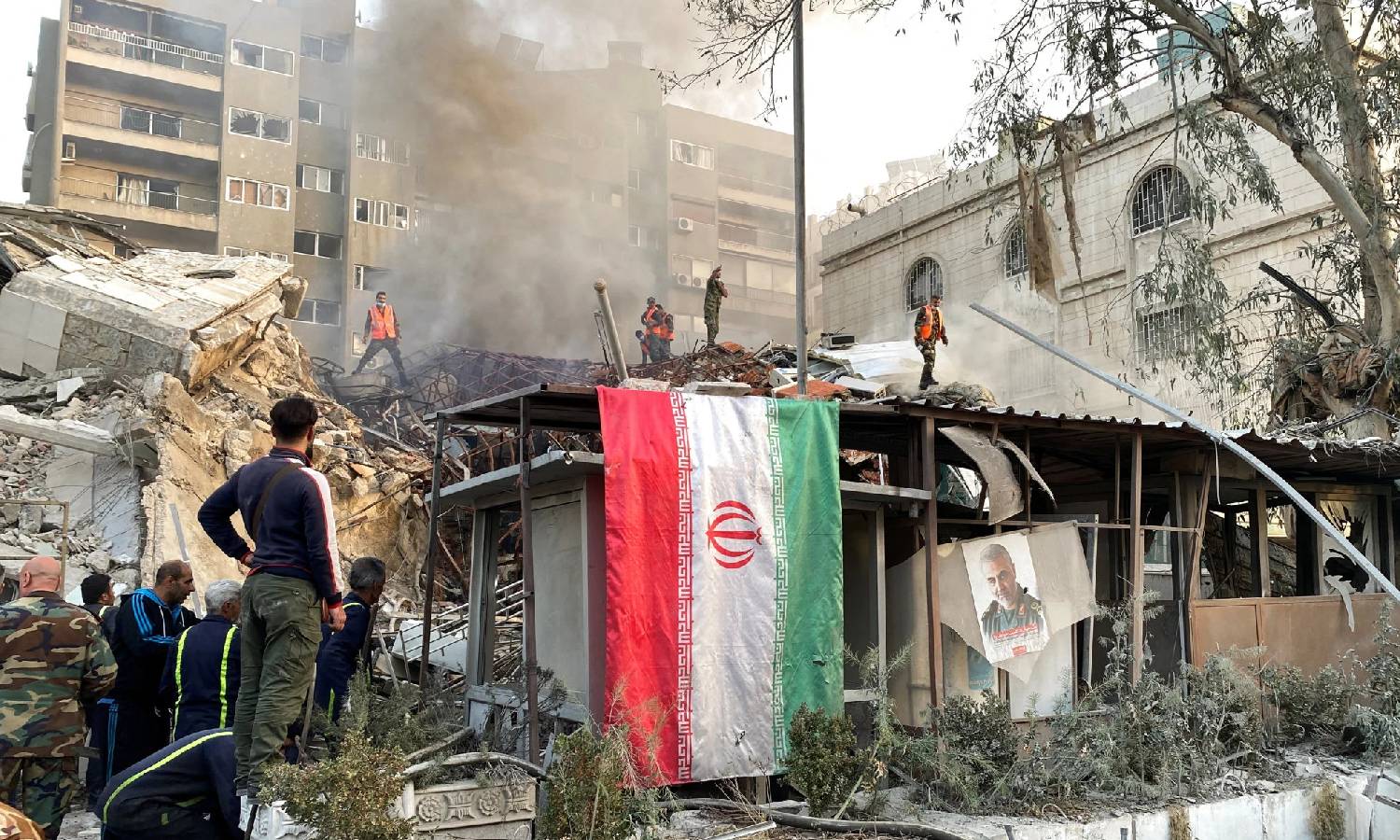



The incident of Israel targeting the Iranian consulate in Syria and the killing of a number of senior Islamic Revolutionary Guard Corps (IRGC) commanders has dominated the media and political scene and has signaled the start of a new phase in the Iranian-Israeli conflict amidst Tehran’s threats of retaliation, following Israel’s hints at expanding assassination operations in Syria and Lebanon.
The death toll of the Israeli attack in Damascus reached 13 people, including seven Iranian military personnel and six Syrian civilians, according to the Iranian Students’ News Agency (ISNA). The IRGC announced the death of generals, (advisors) Mohammad Reza Zahedi and Mohammad Hadi Haj Rahimi, and five of their comrades.
Iran has vowed a “resolute” response to the Israeli raid, with the commander of the IRGC’s Karbala base, Brigadier General Ahmad Khadem Sayyad al-Shohada, stating that Israel will soon receive a “crushing and unprecedented” response. Meanwhile, Iranian President Ebrahim Raisi condemned the attack, saying that his country would punish Israel.
Iran’s Supreme Leader, Ayatollah Sayyid Ali Khamenei, said via the “X” app (formerly Twitter), “With God’s help, we will make the Zionists regret their aggressive crime against the Iranian consulate in Damascus.”
On his part, the Israeli military spokesperson, Daniel Hagari, said that the target Israel hit in Damascus was a “military building, not a consulate or embassy,” and belonged to “Quds Forces,” a unit of the Revolutionary Guard Corps responsible for foreign operations.
The Axios website quoted an unnamed “senior” Israeli official saying that the Israeli military was in a state of “high alert,” in anticipation of retaliatory attacks from militias allied with Iran in Syria.
A report by the Future for Advanced Research and Studies center, prepared by Iranian affairs researcher Sherif Haridy, outlined three scenarios that could follow the targeting of the Iranian consulate headquarters in Damascus:
Direct response: The direct targeting of the consulate and the residence of the Iranian ambassador in Syria places Tehran in an embarrassing position and represents a violation of its sovereignty. The response may not necessarily take place inside Israel, as it seems unlikely because Iran is keen on avoiding a direct confrontation with Israel, especially since the latter has shown that it is willing to engage in conflict on any front beyond its borders.
According to the report, Iran’s direct response may include targeting Israeli ships in the Gulf or Red Sea, targeting diplomatic headquarters or religious centers, as previously occurred in certain Latin American countries, or targeting locations believed to be Israeli intelligence bases, as Iran has done in the past in Iraqi Kurdistan.
Postponing the response: The Iranian threats often revolve around a response “at the appropriate time and place.” This wording may indicate a postponement of the current response, with the possibility of a response in the future.
Considering previous incidents, Tehran seems to favor this scenario. However, its cost, whether domestic (local discontent) or external, might be high and could portray Iran as a “weak state” unable to protect its interests.
Escalation via proxies: This scenario might be Iran’s preferred option, at least for the time being. Iran may push Hezbollah in Lebanon to launch more rockets at Israeli targets and encourage the Houthis to keep targeting Israeli and American ships. It may also urge its proxies in Iraq and Syria to attack Israeli and American interests.
The Islamic Resistance in Iraq issued two statements on Thursday, April 4, claiming in the first to have targeted the Israeli Ramat David Airbase with drones, indicating it will continue such attacks. The statement was accompanied by a video recording showing the drone launch, without specifying the geographical area from whence it was launched.
Hours later, another statement was issued stating it targeted a vital target in Ashdod with drones, as a continuation of what it called “the second phase of the operations against occupation.”
Charles Lister, a researcher at the Middle East Institute, said in his report for Al-Majalla magazine that the magnitude of Israeli strikes on Syrian territory (various areas of Damascus and Aleppo, and the consulate) will undoubtedly require a similar Iranian response. He added that the risks associated with miscalculations would be exceedingly high, as the region has now become a powder keg.
Lister added that historically, Iran has used proxies to respond to Israeli strikes. Despite the freeze imposed by the Revolutionary Guard Corps on proxy attacks against American forces in Syria and Iraq since early February, it is likely now that Tehran will lift this freeze in Syria (and possibly Iraq) in the coming days.
Lister believes that Iran might launch a retaliatory missile strike against Israel, which would likely be designed to be intercepted to prevent the situation from spiraling out of control.
It is unlikely that the Lebanese front will be Iran’s preferred response option, as there is a balance on both sides that has succeeded in avoiding a full-fledged war in recent months. Moreover, Hezbollah, and indirectly Iran, do not wish to destroy their significant interests in Lebanon.
if you think the article contain wrong information or you have additional details Send Correction